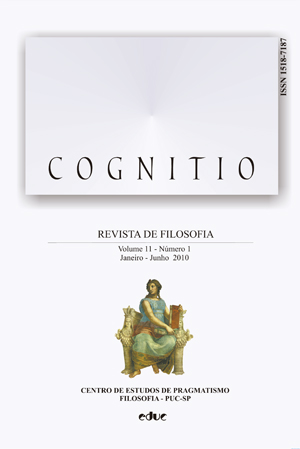Contextualismo, Pragmatismo e Determinação do Sentido
Palavras-chave:
Contextualismo, Determinação do sentido, Filosofia da linguagem, Pragmatismo.Resumo
Em How to Make our Ideas Clear, o pai do Pragmatismo apresenta um princípio que chamarei de Princípio da Determinação do Sentido, que pode ser formulado assim: A raiz de qualquer distinção no pensamento e no sentido das expressões linguísticas se encontra nos seus efeitos sensíveis, em nossas práticas e atividades. Peirce é um dos fundadores da Nova Lógica,mas ele não seguiu o caminho dos fi lósofos da linguagem da corrente lógica (Frege, Russell, Carnap, Tarski etc.). Esses filósofos adotam uma perspectiva “top-bottom” em relação à semântica. A semântica deve ser desenvolvida paralelamente à sintaxe, e os problemas encontrados na semântica são relegados à pragmática (ao famoso “pragmatic waste basket”).Recentemente, os fi lósofos da linguagem inverteram esta perspectiva: é a semântica que deve responder à pragmática, como afi rma Brandom, e, com ele, os contextualistas em fi losofi a da linguagem (Charles Travis, François Recanati, Anne Bezuidenhout, Julius Moravcsik, Putnam etc.). Peirce pode ser apresentado como o primeiro fi lósofo a defender essa perspectiva “bottom-top” na semântica fi losófi ca. Há anos que Travis e Recanati multiplicam os exemplos ilustrando o princípio de Peirce. Nosso objetivo é mostrar como o sentido ou conteúdo de nossas enunciações (“o que é dito”) é determinado em contexto e depende de nossas atividades e práticas, apresentando vários exemplos. Veremos como a leitura de mente (Mindreading) e a estrutura em planos de nossas atividades contribuem para fi xar o sentido das palavras. Mostraremos também como o Princípio de Acessibilidade de Recanati faz eco à ideia de Peirce. O princípio em questão diz que a proposição efetiva e corretamente compreendida em contexto é sempre aquela que é diretamente acessível à consciência do falante-ouvinte.Métricas
Carregando Métricas ...
Downloads
Publicado
2013-01-22
Como Citar
Leclerc, A. (2013). Contextualismo, Pragmatismo e Determinação do Sentido. Cognitio: Revista De Filosofia, 11(1), 48–57. Recuperado de https://revistas.pucsp.br/index.php/cognitiofilosofia/article/view/13376
Edição
Seção
Artigos Cognitio









